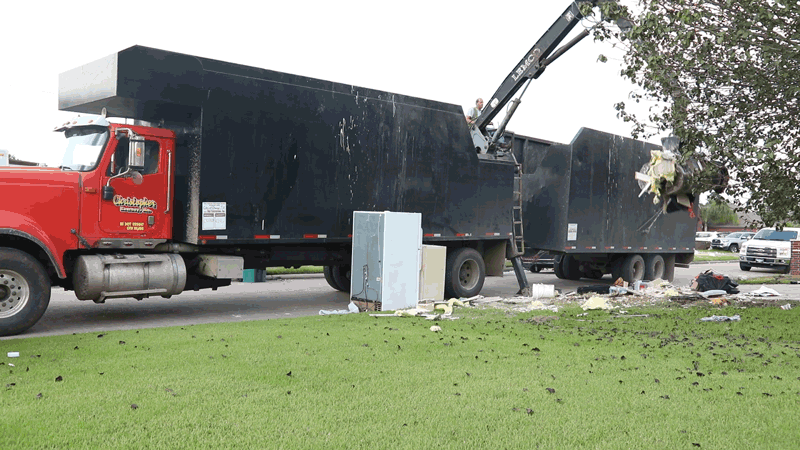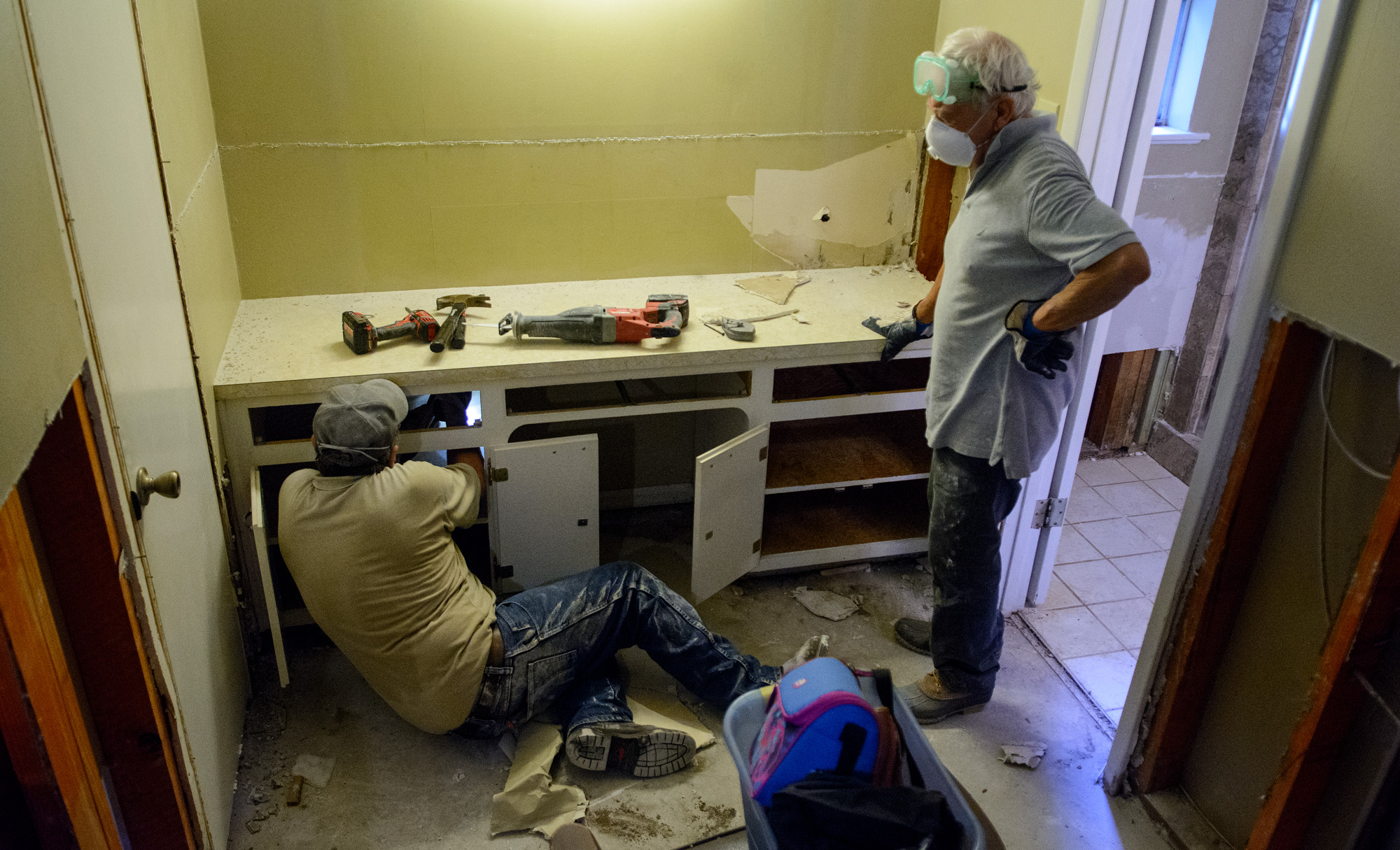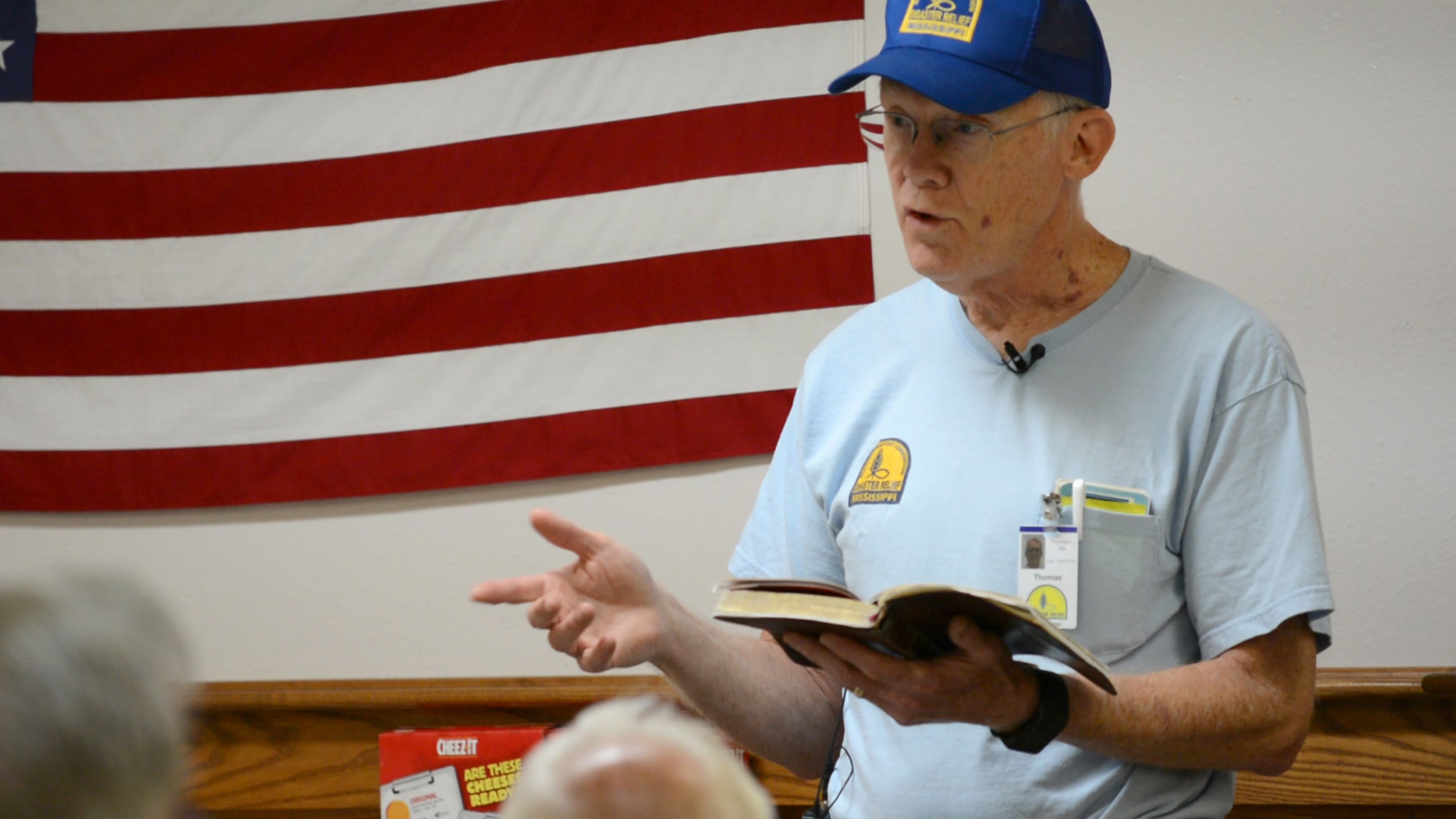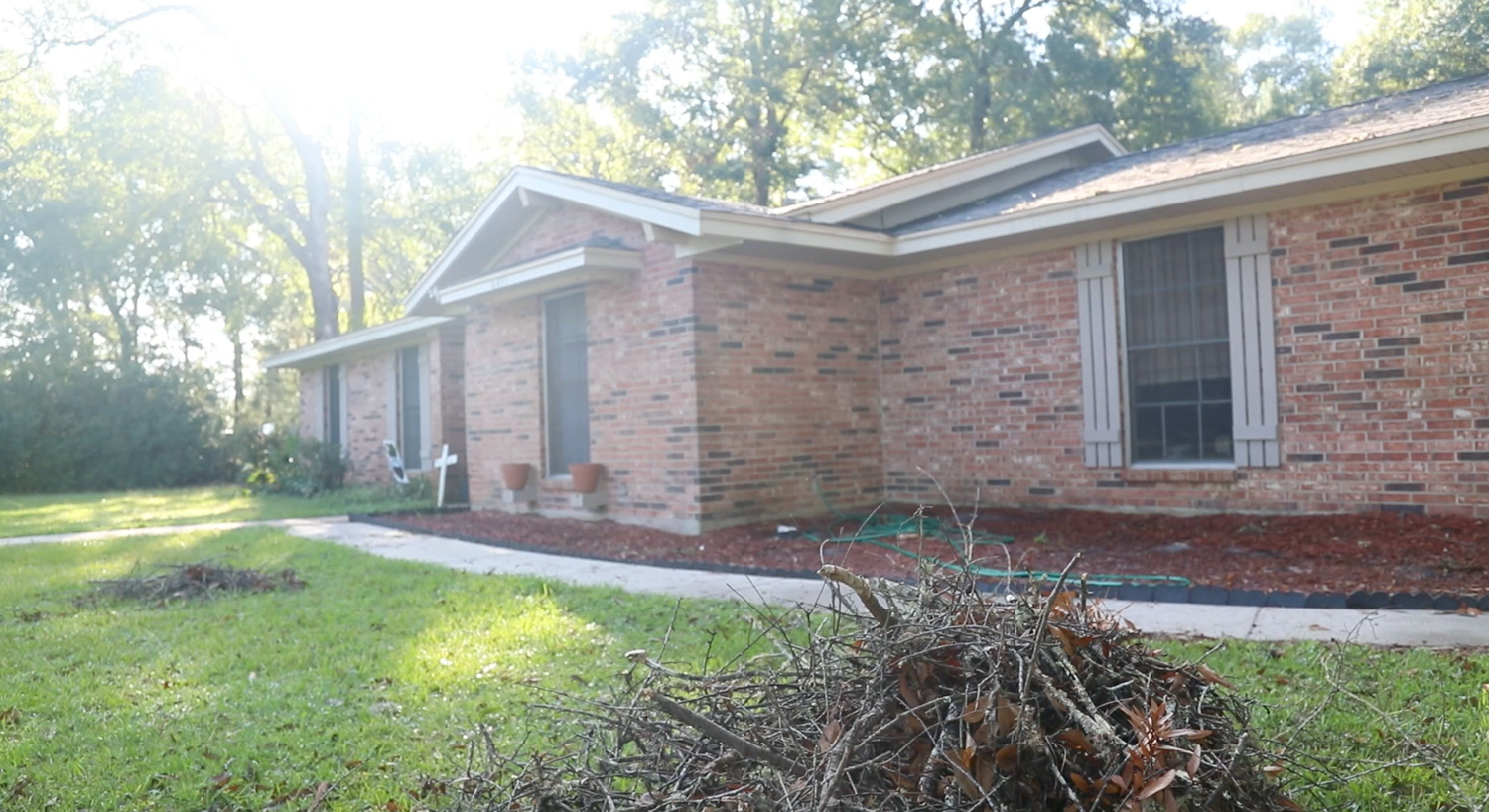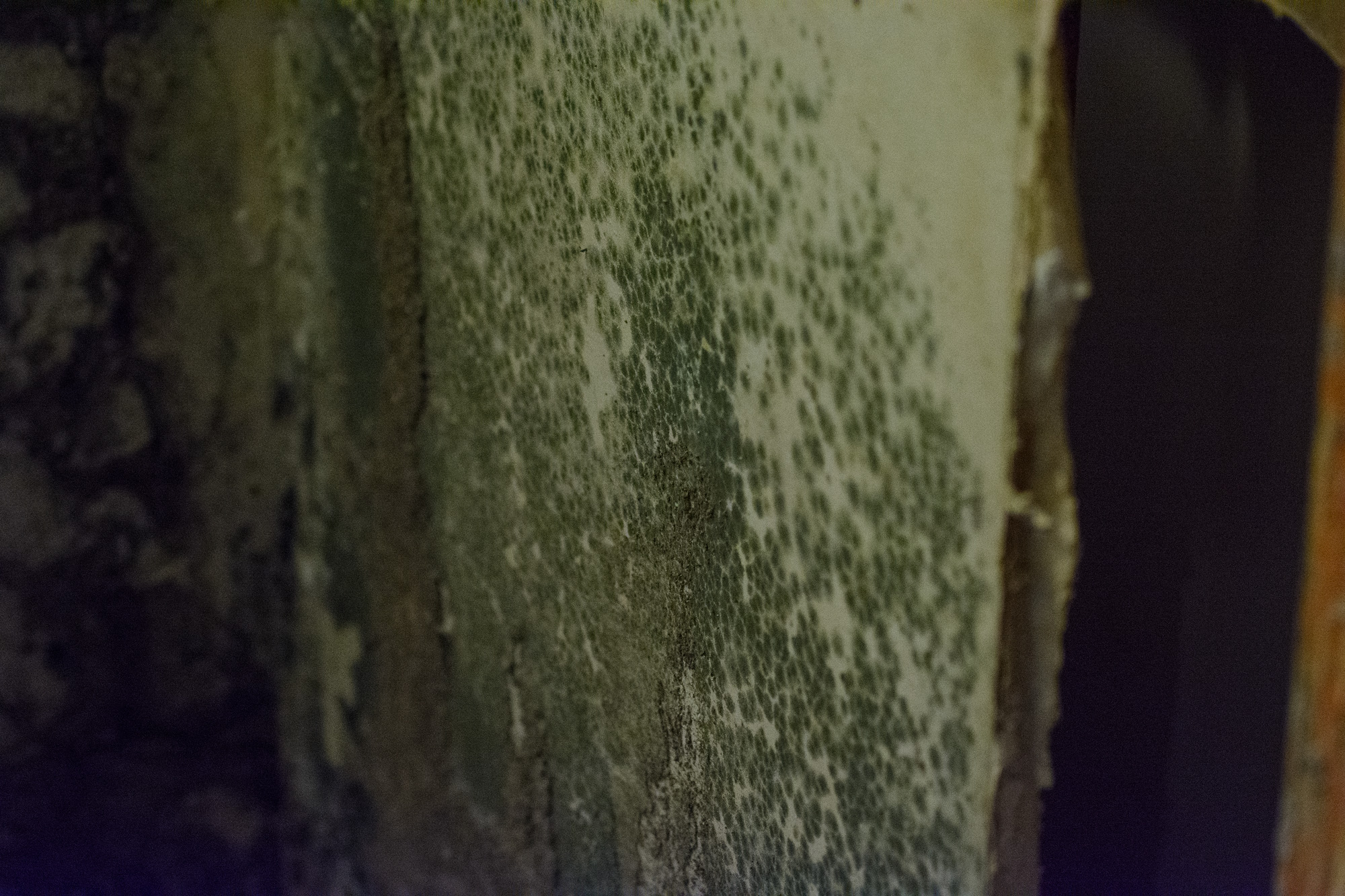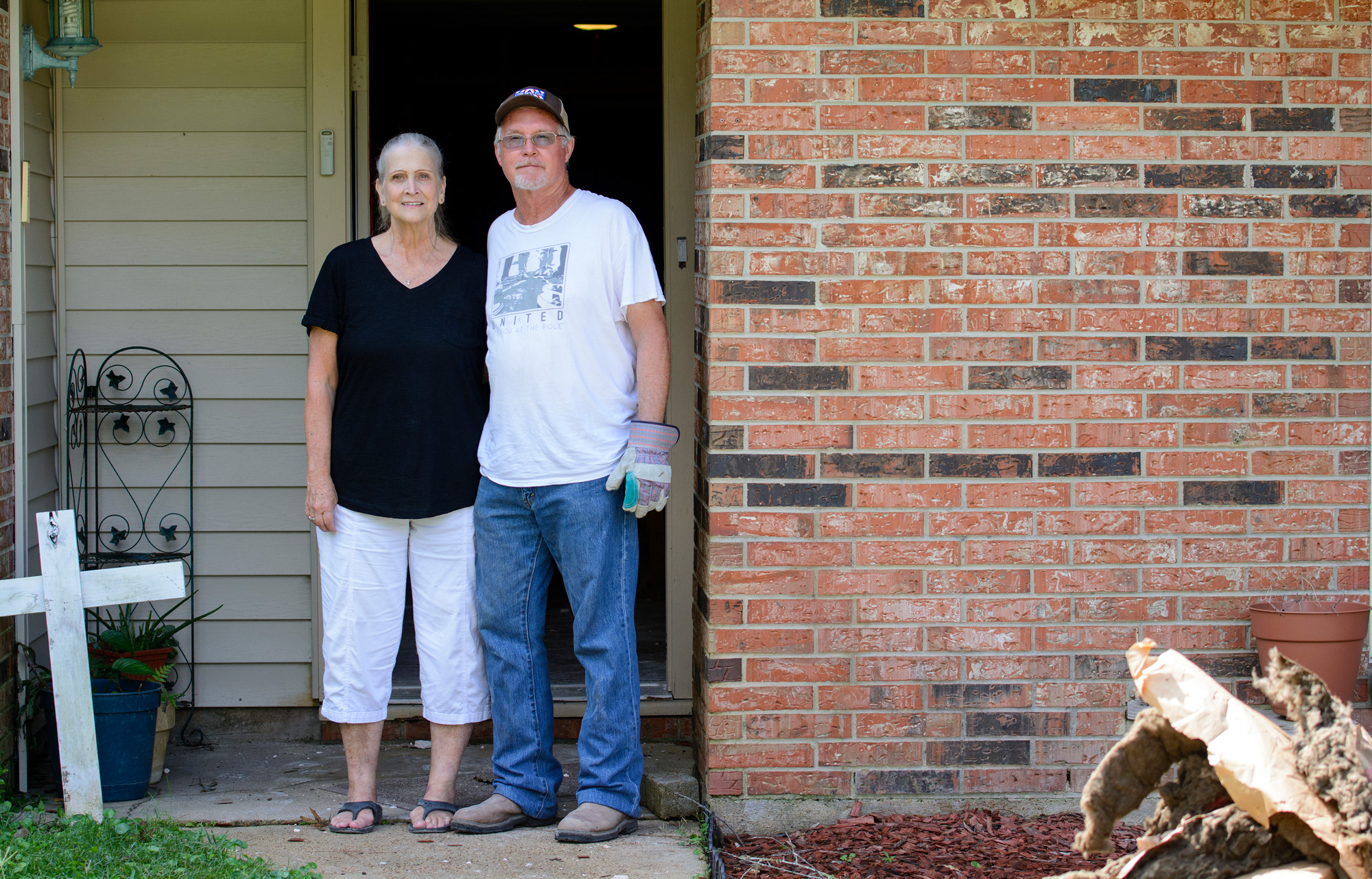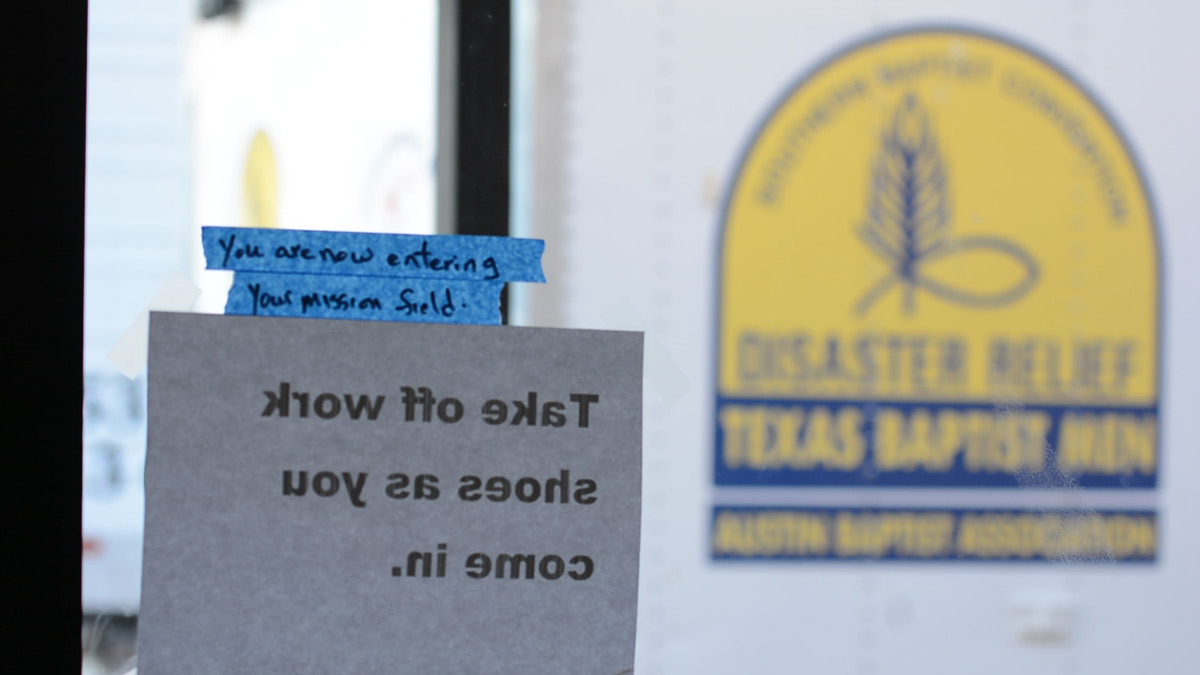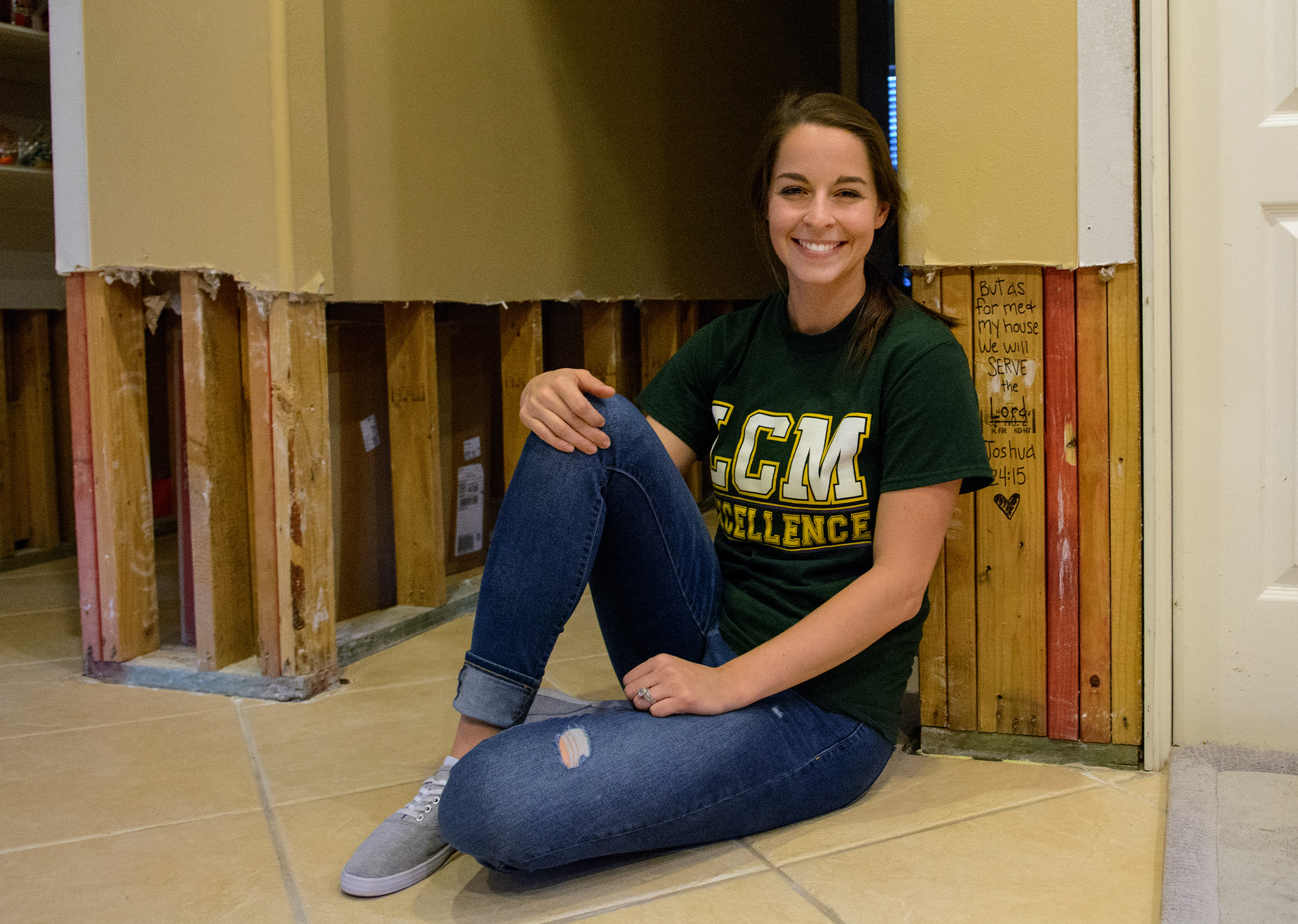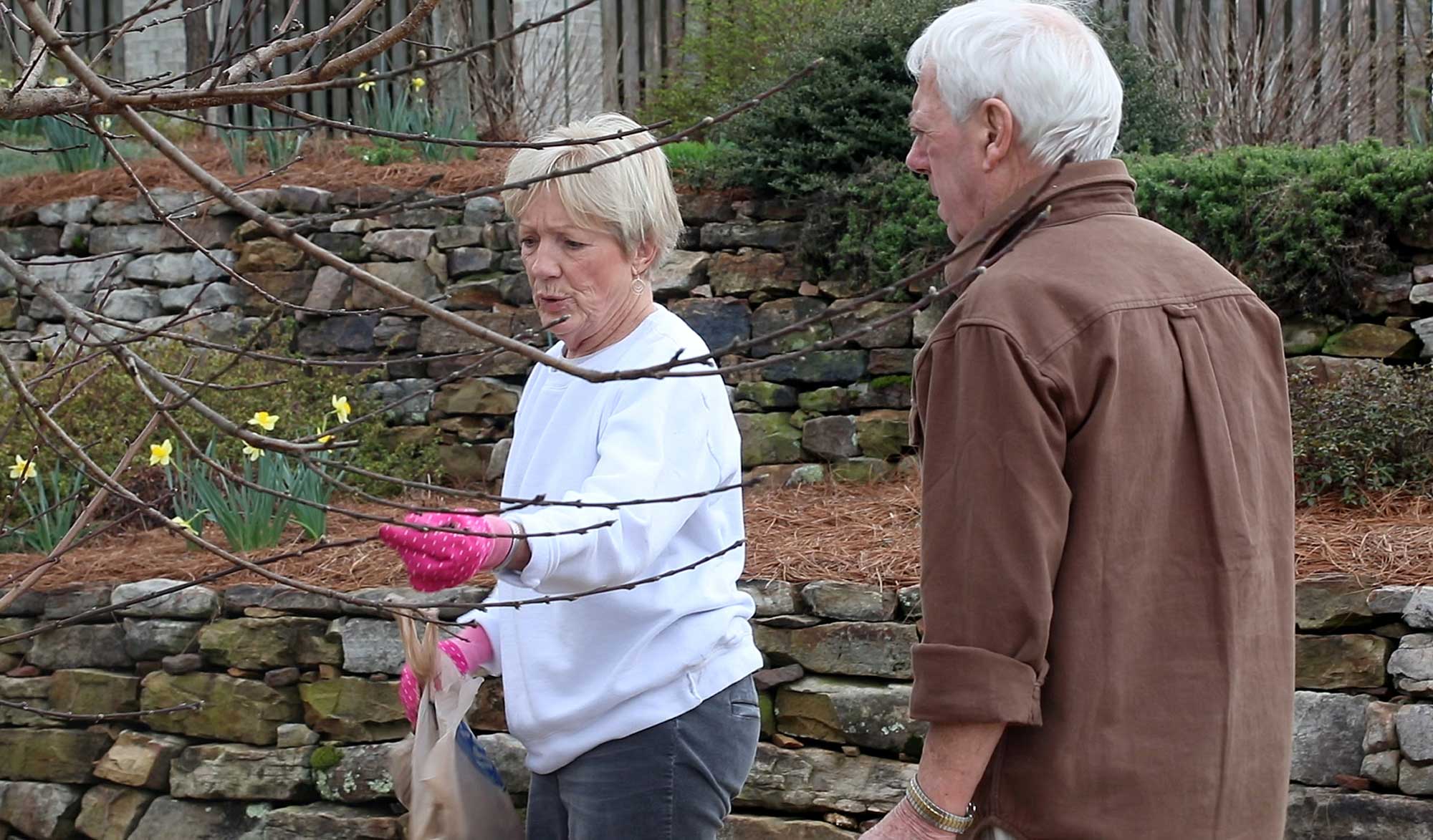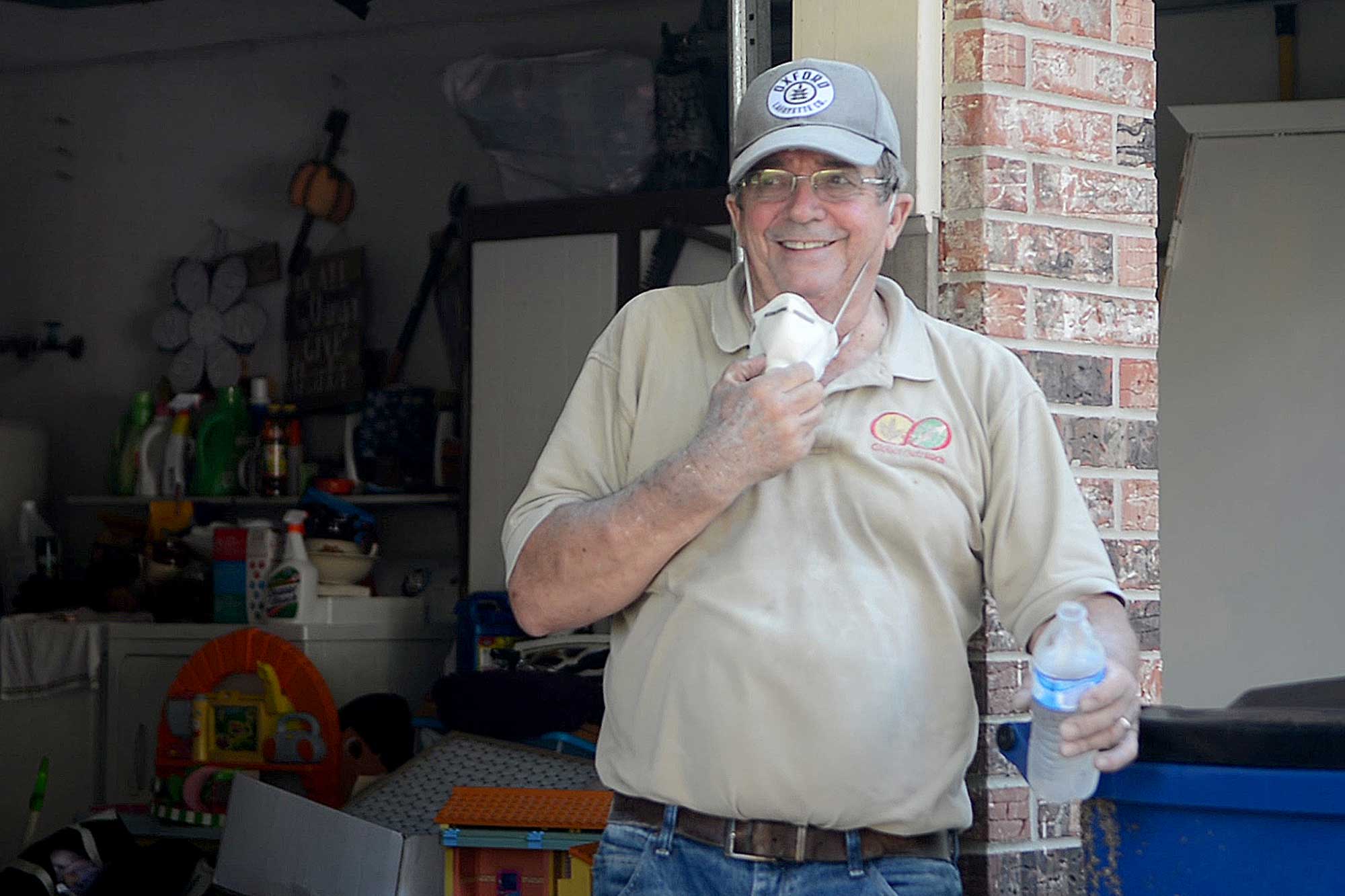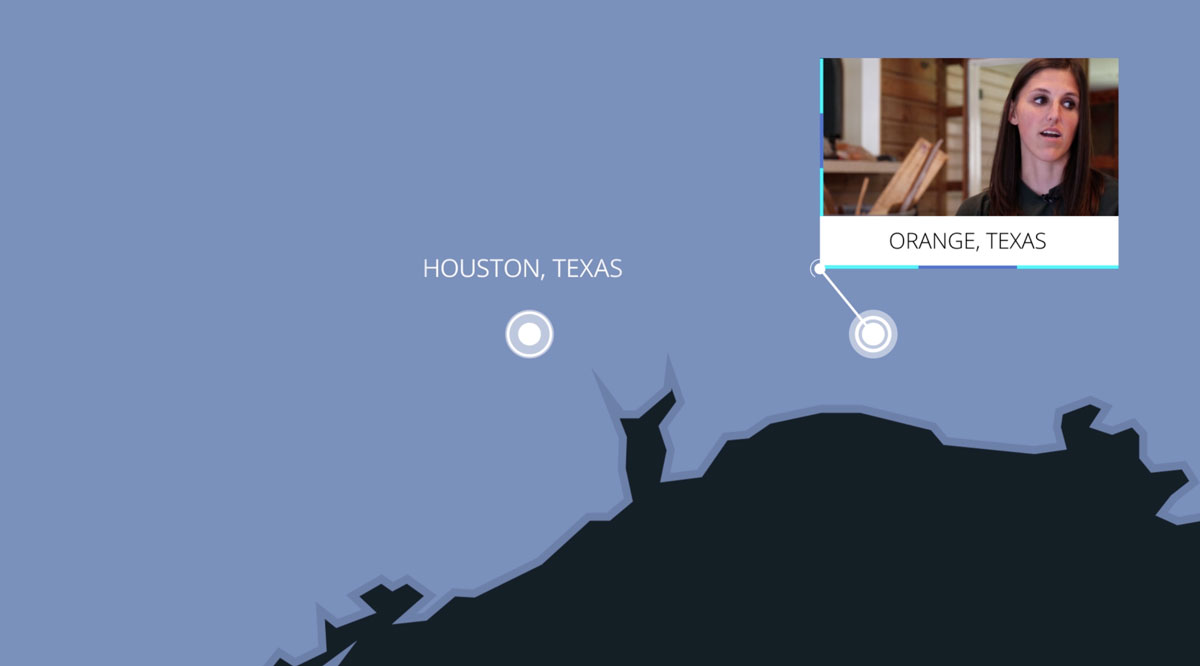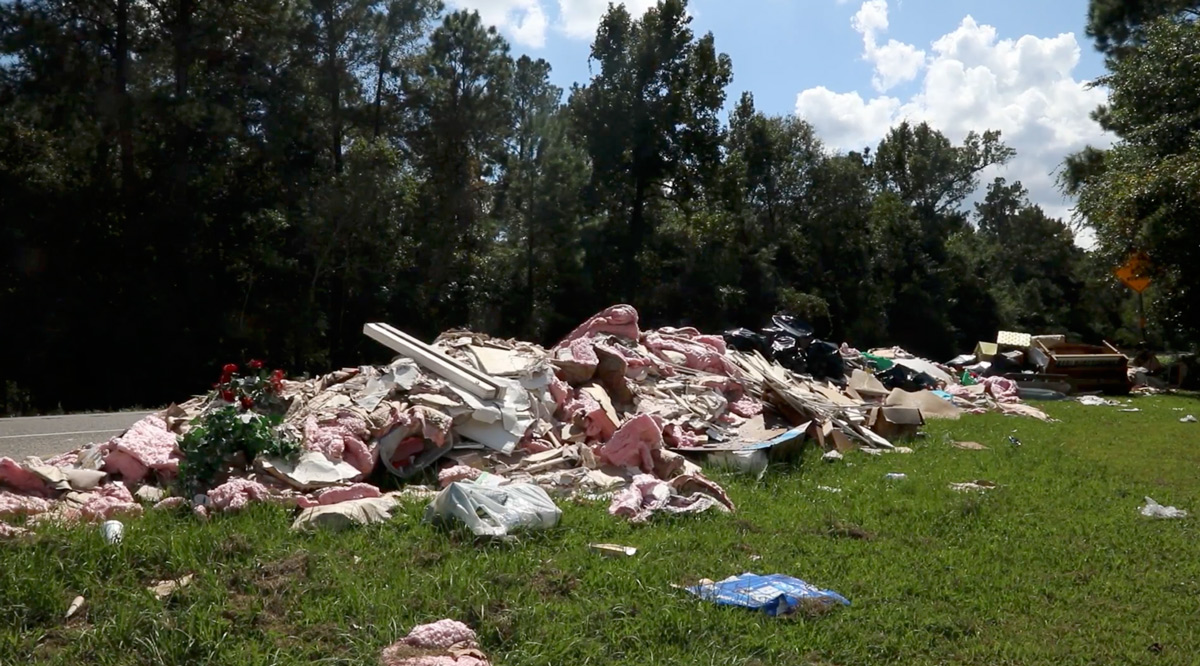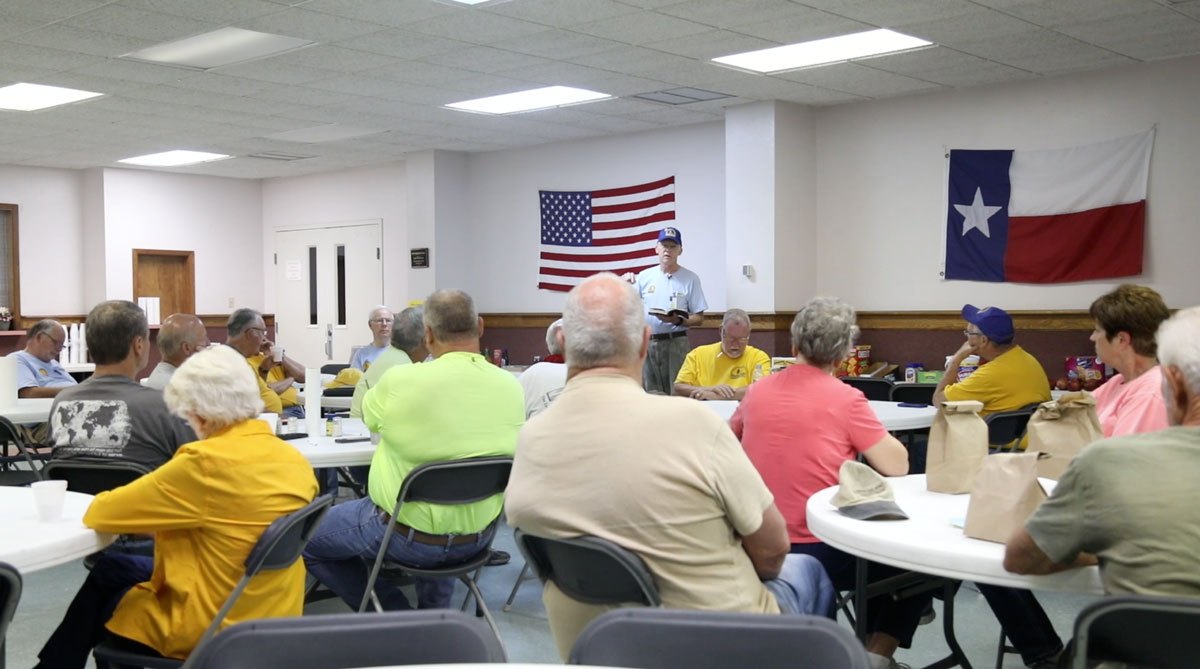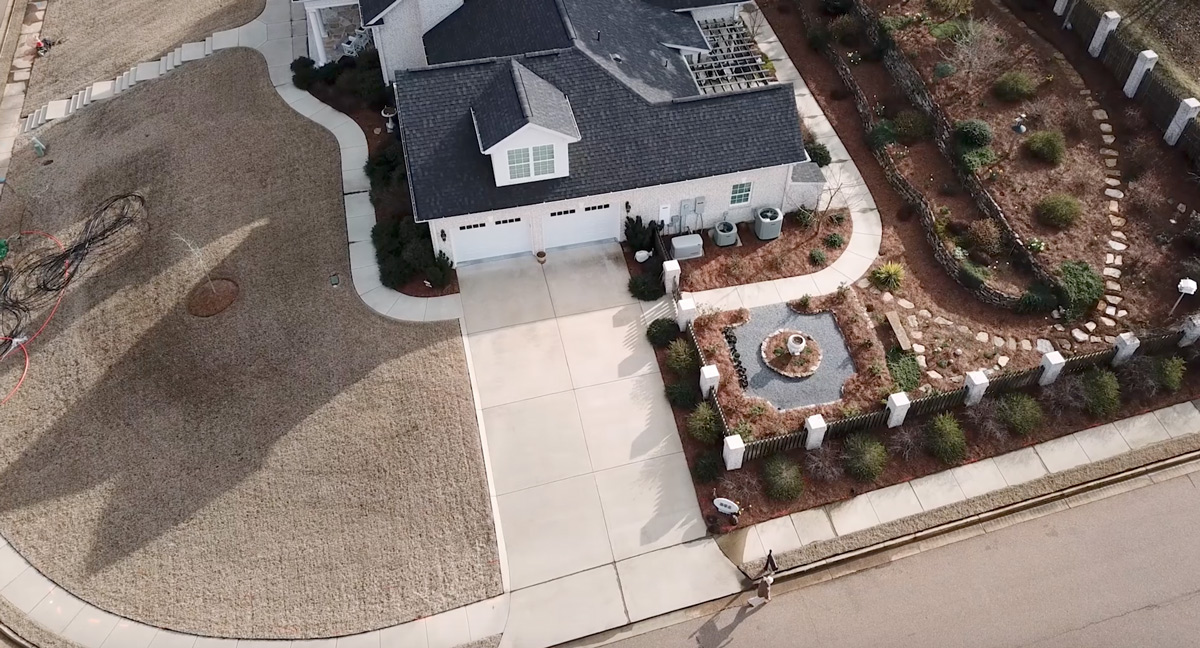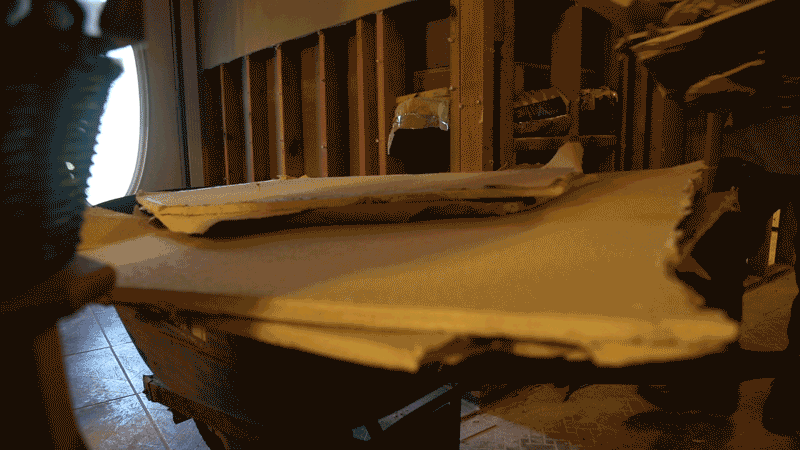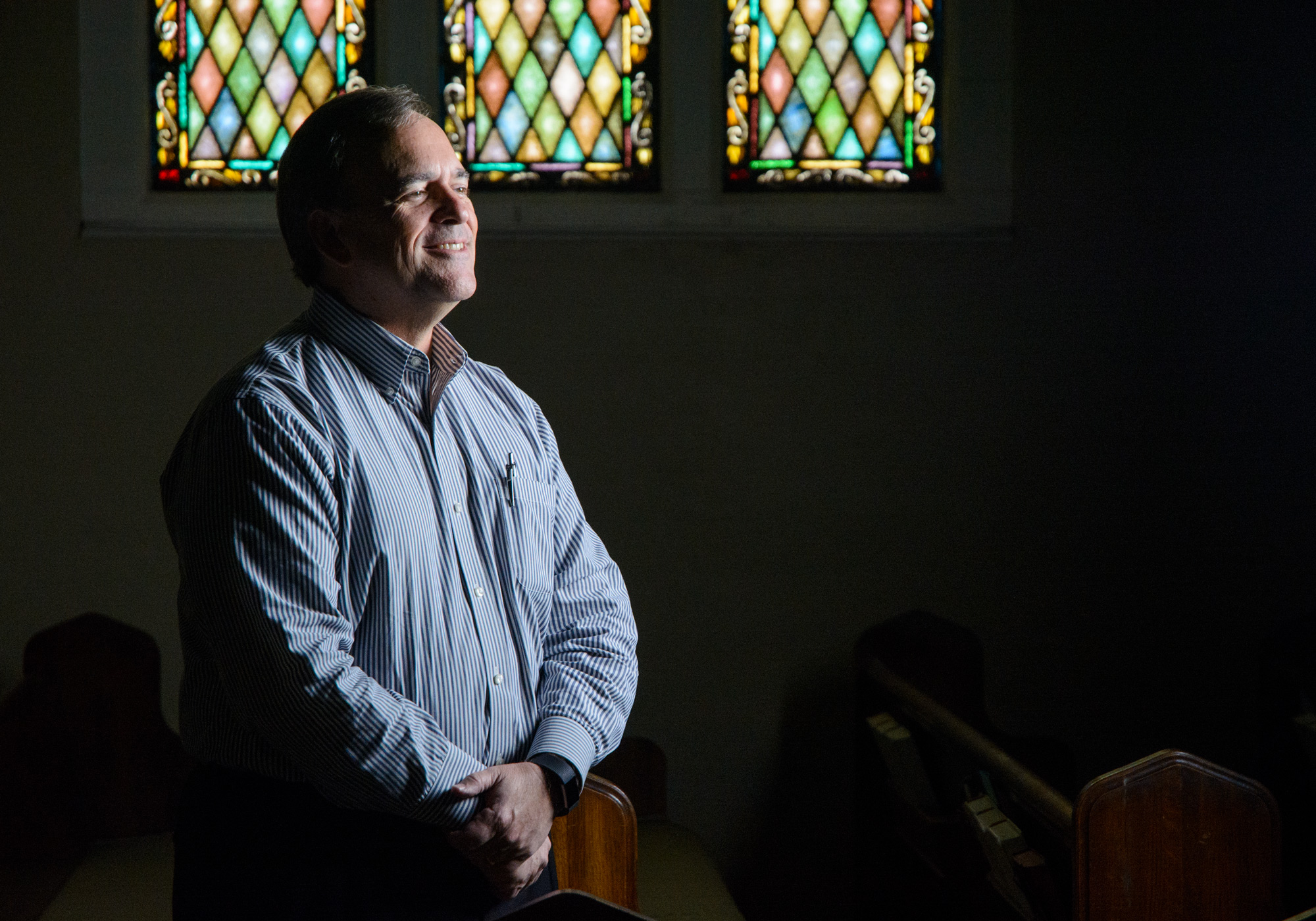
Click to see the locations in Orange County, Texas, featured on this page.
The garbage truck rolled to a stop in front of a pile of debris. Every house on the street had one just like it, and if you stood at just the right angle, all those piles looked a bit like a small mountain range stretching out through the neighborhood.
This is what Hurricane Harvey left behind. A metal claw clamped tight on two leather couches perched on top of this particular mountain, waterlogged and rotting in the Texas heat. They crunched like twigs underfoot, water dripping from them as the claw lifted them into the back of the truck, like an angel of death snatching away a soul.
Bruce Alexander stood motionless in his driveway, watching the claw. Soon the small mountain was gone.
“It’s not just stuff,” he said. “It’s a life on the street.”Before the sun fully rose and the Sunday church bells rang, Lanny Shackelford and Harold Wilson climbed in the silver pickup truck waiting in the parking lot at Oxford’s First Baptist Church, where they’re both members.
It was packed to the brim with construction supplies, tools and respirator masks. Time to go.
The Ole Miss alums were making the trek eight hours southwest to Orange, Texas to spend a week helping residents begin to piece their lives back together after the hurricane wreaked its havoc.
This was the second post-Hurricane Harvey trip for Shackelford, who has a background in construction and has worked abroad on mission trips multiple times before. When the church called upon the congregation to go, Shackelford knew his prior experience could help the team.
Wilson ran a wholesale women’s clothing business out of the World Trade Center in Dallas before moving to Oxford four years ago.
Reports of the turmoil the storm wreaked on his former home state kept him up at night.
“I think it was God’s way of saying, ‘Harold Wilson, get off your lazy butt and make a contribution. Do something for somebody other than yourself,’” he said as tears filled his crystal-blue eyes.
Home Away From Home
Thomas Nix is a busy man. One of the leaders of the Mississippi Relief Team, a Mississippi Baptist Convention agency, he sets up shop in the church’s fellowship hall. For the foreseeable future, this will serve as the group’s headquarters.
Nix answers phones, puts together assignments for volunteers, orients new arrivals, and makes sure volunteers and staff have what they need to get their work done. It’s a busy job, but someone has to do it.
All of the volunteers will get to know Nix because he leads the nightly debriefings and the morning devotional sessions, messages of hope for the people of Texas and a love for Jesus.
Ten minutes past the bright green “Welcome to Texas” sign and a few left turns later, Shackelford and Wilson pulled into the parking lot at North Orange Baptist Church. This would be their home for the next week.
They meet Nix, take their bags upstairs to a Sunday school room and prepare their FEMA mattresses for the night. Then, it’s dinnertime: six o’clock sharp every night with a briefing before.
After prayer, everyone eats.
Shackelford retrieves a stack of stapled papers. It’s his and Wilson’s project assignment. Handwritten pages list off the homeowner’s information and the damage the house endured.
Job in hand, the men head off to bed. Tomorrow’s an early morning, and there is work to do.
4 Inches of Water
The odor of moldy walls, soggy insulation and ruined belongings clogs the nostrils and weighs down the air in John and Sybil Fortenberry’s house.
Much of what was inside their homes now sat on the street. But they still have the memories.
Shackelford and Wilson pulled their goggles over their eyes, hooked their masks around their ears and pulled on their gloves and began their work.
Hammering and buzzing noises filled the house they were working on with sounds of progress.
The Fortenberrys have been married for more than 46 years. They’ve been in Orange that whole time. They’re high school sweethearts, finish each other’s sentences and lead the Calvary Baptist Church together down the road in Deweyville, Texas.
They had planned to weather the storm because their town had never flooded before and they were never told to evacuate.
Once the rain began, though, no one was sure when it would stop.Three nights later, as they were falling asleep, John and Sybil could hear the water lapping at the doorways.
“We knew as the night went on and those storms kept coming through, we thought, ‘Well, that’s not going to be good,’” Sybil said. “Then, we literally were trapped in the neighborhood. There’s only one way in and one way out.”
The rain was getting heavier, and so were their hearts. It was time to take action, and they retreated to a neighbor’s house on higher ground.
They came home as the sun was rising the next day to find 4 inches of water sitting in their hallway. Do not underestimate water, though; inches can destroy an entire house.
The couple doesn’t have a timeline for when its walls will be rebuilt and its house will once again become a home to move back into. They just know they have to get it done.
“Got to recover. Got to rebuild. Got to work on it,” John said. “Got to get your boots pulled up high, get your gum in the center of your mouth and chew hard and get after it.”
↓ 360 View. Click & drag to explore the house.
John Fortenberry walks through his house as he continues to clean up and remove water damaged items.
Back to headquarters…
Relief agency staffers keep busy. Texas and American flags hang on the wall, and the blue painter’s tape stuck on the glass door at eye level reads, “You are now entering your mission field.”
While the volunteers had been at their assignments, Nix and other staffers answer what seem like an endless stream of phone calls, filling out charts and forms and updating the list of completed projects.
The kitchen staff work throughout the day, cleaning up from breakfast, which they woke up at 4 a.m. to prepare, setting out lunch options for volunteers to pack their sandwiches and cooking dinner to feed the hungry stomachs after the sun sets.
Outside, the laundry trailer continues running. Workers clean the dirtied clothes using a meticulous washing process, including mixing vinegar into the detergent to rid the clothes of any mold they might have collected throughout the day.
Next door, hot steam rises from the shower trailer, which is fully equipped with soap, shampoo and towels. Here, volunteers can wash off the dirt and sweat from the unforgiving Texas sun before they sit down for dinner.
There’s something rejuvenating about a full stomach, fresh clothes and a clean body.
Volunteers do their best to help take care of Orange’s homeowners, and in return, the people of Southern Baptist Convention do their best to take care of them. If you ask why they do it, they’ll tell you, “Jesus.”
“As For Me and My House…”
Taylor Willis moved from Arkansas to take a teaching job at Little Cypress Elementary School. Since it was damaged by the storm, the school relocated its classes to North Orange Baptist Church. In addition to serving as a headquarters for Southern Baptist local relief efforts, it was also doing duty as an impromptu school.
Every afternoon, after class is finished and she sends her students home, her workday ends. But she’s just getting started.
She leaves school and goes home to continue working on fixing her house so she and her husband, Josh, can move back in from the RV in their driveway.
Fans hum in every room, making sure every last drop is dry. Clean-up crews cut the drywall 4 feet up from the floor so new sheets could fit in with ease.
Studs peered through the openings. Members of her church had visited earlier in the week and wrote Bible verses along some of them.
“But as for me and my house, we will serve the Lord. Joshua 24:14” was written in black ink on the stud next to a door.
“I wrote that one,” Taylor said, pointing to the top of the doorframe. “It used to hang right there.”
Taylor remembers the night when she knew the rain wasn’t going to stop. When the water first started leaking in, Taylor and Josh piled towels at the doorway until they were sopping wet. Then, they realized there was nothing they could do to stop the water.
“It just rushes in,” she said. “At one point, it felt like a river was going through our house, and we just had to sit back and let it come in.”
Josh was sick, and their dog, Cova, was lying on the kitchen island because she was scared of water. Taylor sat in a chair. She felt the water creep up past her ankles, and all she could think of was the possibility of the water levels eventually hitting her waist.
She called 911. No answer. There was nothing they could do until morning.
When the sun rose, Taylor slid on a fluorescent vest she’d found and sat on top of a ladder at the foot of the driveway next to the mailbox. She knew daylight meant rescuers would be coming through.
Boats made small ripples in the water as they slowly passed, each already on a mission to rescue someone else but promising to come back. After more waiting, it was her turn. Taylor, Josh and Cova loaded into a Razor car and watched their neighborhood grow distant in the rearview mirror.
↓ 360 View. Click & drag to explore the house.
A steady hum drowns out the silence in Taylor Willis’ house as fans dry out the structure in preparation for new walls to be installed.
“I just looked and my husband, and he was like, ‘I just feel so hopeless,’” Taylor said.
It was four or five days before Taylor could come home. When she did, there was no time to grieve. It was time to get to work.
“I wanted to just bawl my eyes out but didn’t have time to do it,” Taylor said. “It was an overwhelming feeling seeing our house like that after the flood. It’s incredible what water can do over time when it sits.”
Taylor believes that things will be OK. But, like many other Texans, she has also had to deal with the mental and emotional toll the hurricane left in its tracks.
“I don’t like the sound of rain. It used to be relaxing, but not anymore,” Taylor said.
“The Greatest Days
of My Life”
Wilson said that all he could think about while he lay restless in bed the night before he and Shackelford left Oxford was how he could get out of going to volunteer in Orange, Texas. A couple of days in, though, and he’s glad he didn’t.
“I got to tell you something,” Wilson said. “It’s been two of the greatest days of my life.”
As hard as he tries, he can’t find the words to describe the experience to his wife when he talks on the phone with her each night.
“She said, ‘Why are you so emotional about it?’ and I said, ‘Because their life is out on the street, and what’s not on the street, that’s what Lanny and I are going to do in the next week,’” Wilson said.
Wilson said his life changed in the last month. He was baptized again the Sunday before he left for Orange.
“It’s me having to learn that on a scale of 1 to 10, I’m not the 10,” Wilson said. “I lived my life thinking I was the 10, and I’ve come to realize that I’m the 1.”
Wilson used to throw money at a problem, thinking that would make it go away. Now, he sees that’s not the case.
“These are born and bred Texans, and they’re wonderful people, but they need help,” Wilson said. “They need money, but they need people. They need volunteers.”
Shackelford retired in January but knew he would set out to do some sort of mission work.
“I’ve done a lot of this, and I knew when I retired I was going to do as much of it as I was physically able to do,” Shackelford said. “So, it wasn’t something that came overnight.”
He said no one can witness a disaster area and it not have any effect on him.
“You’d have to have blinders on,” he said. “It changes everybody’s perspective on life, basically how short life is, how things, possessions, can be gone overnight.”
Shackelford has learned that taking care of others is everyone’s responsibility.
He doesn’t mind the long days and hard work much, because he knows it needs to be done.
“Myself and Harold are close to the same age, so a long day is hard, but it’s a difference in what you do during the day that makes it more or less worth it,” Shackelford said. “I’ve never regretted it. I might be tired, but I’m not that tired.”
SURVIVORS
Hurricane Harvey dropped more than 50 inches of rain on southeast Texas in a matter of days. The Category 4 storm washed away cars, flooded homes, and damaged or destroyed most everything in its path. It also forced many residents to relocate while they gutted their houses, repaired their schools, and fixed their storefronts. And that takes time.
VOLUNTEERS
With more than 65,000 trained volunteers, the Southern Baptist Convention’s disaster response is massive. Teams from around the country traveled to Orange to aid with the Hurricane Harvey recovery. Efforts ranged from gutting and rebuilding houses to providing laundry and shower services for both volunteers and survivors.
A CHANGED HEART
Harold Wilson still sits next to his wife Ann in the sixth pew in Oxford’s First Baptist Church every Sunday, like always. He’s still dressed sharp with his pleated pants and pocket square, like always. He still greets everyone with a smile and a wave, like always.
From the outside Wilson looks the same as always. Take a closer look, though…
At age 76, Wilson had always lived a life of comfort, wealth, and ease. Until about a year ago, when he almost lost it all.
He was working on the flowers in the garden with Ann, like they do most days, when he couldn’t feel his right leg anymore.
“It’s like it wasn’t there,” he said. “I got up, hobbled around to the carport where Ann was and told her that something had happened and I didn’t really know what it was.”
She handed him a soda in hopes that would help, but he couldn’t close his hand around the bottle and spilled it all over himself.
“I think I’ve had a stroke,” he said.
Within 10 minutes he was in the emergency room. He would recover, and as he did, Wilson began to think that maybe that stroke carried a message.
“God was really good to the Wilsons,” he said. “I jokingly say this, but I am serious when I say it, I can talk, I can see, I can walk, I can think. I can do all the things I could do before I had the stroke and most people who have strokes can’t do that.”
Wilson has marked that day on his internal calendar and circled it in red.
“It’s not about me and the sad thing is when it takes you until you’re 70 years old to realize that,” Wilson said. “I thank God for the realization of it now.”
Despite he and his wife both being loyal to the church all their lives, Wilson quietly wrestled with his faith for some time. After the stroke, he was planted more firm in God’s word than ever and wanted to make it public.
So, he was baptized again.
“I remember thinking that if you can’t remember the day of your baptism and if you can’t have memories of the most special time in a Christian’s life, then you ought to do it again,” Wilson said.
Paying it Back
Hurricane Harvey’s rain moved across southern Texas and didn’t stop for several days, washing away cars, seeping into homes, and ruining everything in its soggy path.
Oxford’s First Baptist Church began sending cohorts of volunteers as soon as they could. But the town wouldn’t be fixed overnight. Recovering from a flood is difficult. It takes time. It takes money. It takes manpower.
Wilson wanted to help provide some of those things, but it took him a while to decide to volunteer to go himself.
“He got the idea and he thought about it,” Ann said. “We talked about it. At first he really wanted to go, but then it was like he had to go. There was no stopping him.”
He said he could hear God tell him, “Harold Wilson, get off your lazy butt and do something for someone other than yourself.”
So, in early September, roughly a month after Harvey hit, Wilson traveled with another volunteer, Lanny Shackelford, to Orange, a small refinery town in the state’s southeast corner.
They spent five straight days working in the hot Texas sun repairing a couple’s home during the daytime and sleeping on FEMA mattresses in the North Orange Baptist Church at night.
Shackelford, a construction veteran, was well-versed in mission work and rebuilding projects, but for Wilson it was all new.
Their project assignment was to finish gutting a house. The owners had begun tearing out wet sheet rock, cabinets and countertops, and other bits and pieces. All of it would end up in a pile for a FEMA truck to eventually pick up and carry away.
“We were going to take these people’s life and put it out on the street,” Wilson said. “It was so totally, completely alien to anything I’d ever done.”
To his surprise, he excelled at the work he had to do.
One of his tasks was to push the wheelbarrow with the waterlogged sheetrock from the carport to the pile on the street whenever it filled up.
The first time he did it, he gripped the wheelbarrow’s handles and looked ahead. The pile was uphill.
“When I started up the hill, I thought, ‘I’m not going to be able to do this,’ and I just said, ‘You know, God, if you want me to get this up the hill, I’ve got have a little help.’ So, all of the sudden I pushed it up the hill and then probably 50 times after that over the next five days,” Wilson said.
Every now and then, he would stop his work and take a photo with his phone. He struggled to find the words to describe everything he was seeing and experiencing and hoped these would help when he came back home and shared his story.
Those photos are still on his phone. Every time he went to delete things, his finger paused over them, but he kept scrolling.
At the end of each day, Wilson would pace in the parking lot as he talked on the phone with Ann. After more than 55 years of marriage, it’s hard to be away.
He cried every time she said hello.
“She wanted me to explain to her why I was so emotional and I couldn’t,” he said. “It was harder for her than me because I couldn’t explain what we were going through, what we were seeing. She handled it like a trooper, like she always does.”
Paying it Forward
In Wilson’s first night back in his own bed he was restless, tossing and turning through the night. He couldn’t stop thinking of the piles of ruined belongings on the sides of the roads, the smell of the growing mold tingled his nostrils, and the faces of the survivors burned into his mind.
Wilson’s work in Orange didn’t stop when he left. There was at least one more thing to check off his list.
The homeowners he helped during his stay, John and Sybil Fortenberry, also lead Calvary Baptist Church in Deweyville, Texas, just a few short minutes up the road from their house. This was the second flood the church had recently experienced and they lost a lot this time around, including their pews.
He had to do something more to help.
Wilson got back to Oxford on a Saturday night and that Sunday morning in church, he approached his pastor, Don Gann, about the trip. The conversation kept circling back to the Fortenberrys’ church, when missions pastor Jeff Holeman walked up.
He told Wilson the congregation had just raised money for a disaster relief fund and asked if he would want to give the money, about $26,000, to that cause.
Without hesitation, Wilson said yes.
“First Baptist Church of Oxford sent them every dime we had collected and that got their church open and operating again,” Wilson said, tears welling in his eyes. “I will remember that for my whole life.”
Gann said he saw a change in Wilson before he traveled to Orange and when he came back.
“I think the thing that happened in Orange, was that he really saw that he could do something to help people and God really used him to do that,” Gann said. “There are opportunities to utilize the gifts and talents that God’s given you in a lot of different ways and Harold is a great example of that. Harold’s not a construction guy or anything like that so it’s not like he came in with a hammer on his belt or anything, but he was just willing to do it.”
Wilson said that these days he tries to do something every day to make the world a better place than it was before or say something to someone that will make them a better person.
So much so, he is attending a training to become a full-time member of the Mississippi Baptist Disaster Relief team this month.
“He’s my hero,” Ann said. “He’s always been my hero. He’s not perfect but that makes him a better hero because you climb to become better and he has. I am proud of him and I wouldn’t trade him for anything.”
That’s all he’s hoped for.
“First of all, I hope God can see the difference in Harold Wilson and I hope my family can,” he said. “Beyond that, everybody can handle it on their own. I look at myself in the mirror and I see a different person.”
↓ 360 View. Click & drag to explore the church.
Calvary Baptist Church set up folding chairs for services in the meantime while the building is being repaired. The former church pews and flooring lay on the curb molding. The two-tone walls signify a waterline, the bottom half replaced by new drywall and the top still the old, unharmed wall.
ABOUT THIS PROJECT
As the 2017 fall semester began, the South was in the midst of the busiest Atlantic hurricane season ever. Soon, Texas was in the crosshairs of Hurricane Harvey. The large contingent of Texans on campus, along with the rest of us, watched as the storm poured its misery out on the state. As it did, Ole Miss student media searched for ways to connect what was fast becoming a national story to our community. We heard a local church was sending cohorts of volunteers to Orange, Texas, to help with relief efforts. They were willing to let a team of student journalists tag along, so we did. As we spent time with the volunteers, both in their headquarters and in the field, we kept finding stories we needed to tell.
MEET THE TEAM BEHIND
“AFTER THE STORM”
REPORTING
Lana Ferguson | Marlee Crawford | Abbie McIntosh | Italiana Anderson
TEXT STORIES & 360 IMAGES
VIDEOS & PHOTOS
BROADCAST NEWS PACKAGES
FIELD AUDIO
GRAPHIC DESIGN
ADVISERS
John A. Baker | Ji Hoon Heo
SPECIAL THANKS
Will Norton Jr. | Pat Thompson | Charlie Mitchell
